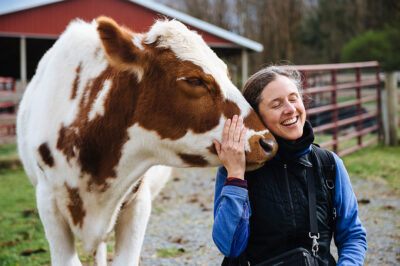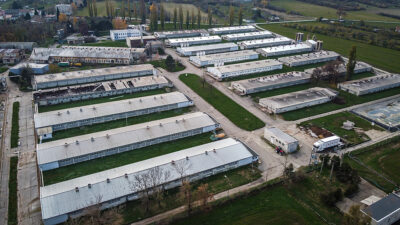Animals experience cruelty from humans in many different contexts. Wherever they are being used for profit, they are vulnerable to being mistreated. Unfortunately, animals who are kept as companions are also at risk of abuse. But there are ways to help these animals and create a better future for them.
1. EDUCATE AND RAISE AWARENESS
Animals are clever, feel joy and sorrow, and are often more complex creatures than many people assume. In fact, people consistently underestimate the mental capacities of other animals. This is likely because they are motivated by their desire to eat and otherwise use animals to believe that they are just mindless automatons. It’s possible to help people see the truth though, and in doing so encourage them to think twice about harming animals, directly or indirectly.
The documentary My Octopus Teacher had a huge impact on public understanding of the intelligence of octopuses, and has helped to galvanise the international backlash against the octopus farm that is supposed to open in the Canary Islands this summer. When journalist Henry Mance wrote about the rich interior lives of pigs in the Financial Times, quite a few commenters said they would not eat pork again or would try to cut down. Sharing these kinds of articles and films can help educate others that animals are worthy of moral consideration and respect.
2. REPORT ABUSE TO AUTHORITIES
Many of us feel like it’s not our place to interfere when we see someone doing something wrong. But if you see an animal being abused, it’s important to call the police or other authorities straight away. It could save that animal’s life and stop the perpetrator from inflicting torment on other animals in the future.
To report abuse, you need to know what it looks like. Direct violence or aggression towards an animal is the most obvious form it takes, but abuse more commonly takes the form of neglect, which can be harder to identify. Signs might include animals who are very thin or have a dishevelled appearance, like very matted fur or fur in poor condition. Hoarding animals also creates conditions in which they may not be properly cared for.
3. LOBBY FOR BETTER ANIMAL PROTECTION LAWS
A number of landmark laws giving animals greater protection have been passed over the years thanks to the determined campaigning of animal advocates. For example, Lucy’s Law, which came into force in England in 2020, banned pet shops and dealers from selling puppies and kittens under six months old. It requires anyone wanting to get a new puppy or kitten to buy direct from a breeder where they see the mother interact with her babies, or adopt through a rescue centre instead. A petition to the European Commission resulted in new legislation to ban cages for all farmed animals in Europe by 2027. England banned the use of wild animals in circuses in 2020. None of these victories would have happened without lobbying and campaigning.
4. ADOPT OR FOSTER ANIMALS FROM SHELTERS
There are always animals in need of homes who have either been abandoned or whose owners are no longer able to care for them properly. If you’re not ready to adopt, you can always foster animals to help them adjust to home life and to give the shelter more space for others in need, until a forever home can be found for them. This can even lead to “failed fosters” where the animal and the foster carer discover they’re actually just right for each other and don’t want to be parted.
5. CHOOSE ANIMAL-FREE PRODUCTS
Many ingredients in products from cosmetics to medicines and household products are derived from animals, and it is often impossible to know what sort of lives those animals had. One thing will be certain though, and that’s that their lives were cut short in the slaughterhouse. Look for products that are both vegan and cruelty-free (meaning not tested on animals) to ensure that no animal suffering has contributed to making your moisturiser or hand soap.
6. CARE FOR YOUR ANIMAL COMPANIONS RESPONSIBLY
Every animal is an individual, so looking after them responsibly means knowing what your particular animal wants and needs to have a good life. Making sure their dietary needs are being met and that they are not eating too much or too little is crucial, as are regular vet visits and keeping track of any medication or vaccinations they need.
Caring for animals responsibly also means not letting your companion animal inflict harm on others, whether that’s cats hunting birds in the garden or dogs chasing and frightening wild or domestic animals. Spaying or neutering your companion animals is important to prevent the birth of unwanted animals, but if you don’t want to do that then make sure you don’t let them breed by accident.
7. VOLUNTEER AT ANIMAL SHELTERS
Animal shelters often depend heavily on volunteers to clean or provide socialisation for the animals to get them ready for adoption. Some also need people to help walk their dogs to make sure they’re getting enough exercise and stimulation. Not all volunteer roles involve being hands on with the animals, but that doesn’t make them less important. You could fundraise, help with admin, or do public outreach. The Blue Cross even has volunteer opportunities in its pet bereavement service, supporting people who are struggling with grief after their pets have died.
8. SUPPORT ANIMAL RESCUE ORGANISATIONS
Most animal rescue groups are run by volunteers and operate on a shoestring budget. You can support them by donating, helping to raise money, or checking if they need equipment or other items like toys, blankets, or food that you could either buy for them or get people to donate.
9. SPREAD THE WORD ABOUT ANIMAL CRUELTY
Marketing campaigns by the meat industry persuade a lot of people that the animals they eat have lived happy lives and had quick, painless deaths. Yet in reality most animals will have been raised in intensive confinement and all will have ended up in slaughterhouses, where they can be subjected to terror and prolonged suffering. Making others aware of the reality of life for most farmed animals can help to counter the bucolic illusion pushed by meat producers.
Other types of animal cruelty are less apparent, including the experiences of captive wild animals such as many of those kept in zoos or used in tourist attractions. Spreading awareness of the cruelty that can occur in these industries — like elephants visited by tourists in Asia being kept in chains and subjected to cruel training methods — can help to steer people away from supporting these places.
10. ENCOURAGE COMPASSION TOWARDS ANIMALS
Lead by example, show compassion towards animals, and teach others — especially children — what it means to be kind and respectful to animals. This includes understanding that animals are not here for our convenience or benefit, but are valuable in their own right, and that abusing them physically or verbally is never okay.
11. GO VEGAN
The most abused animals on Earth are the ones who are farmed for their meat, milk, or eggs. Of the estimated 31 billion land animals who are being farmed at any given time, more than 70 percent are raised in factory farms, where they not only endure awful living conditions and are subjected to cruel but legal practices like beak trimming and tail docking, but are also vulnerable to additional abuse from farm workers. Going vegan is the easiest way to stop supporting a system that causes immense animal suffering.
WHY IS IT IMPORTANT TO STOP ANIMAL CRUELTY?
Animals are our fellow inhabitants of this planet, not ours to do with as we please. They are capable of feeling pleasure, pain, and grief. They play, plan ahead, and make friends. They deserve to be able to live their lives free of harm, just as humans have the right to do. Cruelty to animals, whether it occurs in institutional settings like farms and laboratories, or at the hands of individuals mistreating their pets, is wrong.
CONCLUSION
Most people don’t want to see animals suffer, yet most implicitly endorse it by consuming animal products, particularly those from factory farms. In other cases, they engage in activities that are abusive to animals like tourist attractions, perhaps without being aware of why those activities are cruel. The task of protecting animals from abuse can seem huge, but there are plenty of things we can each do to make the world a kinder place for them.





